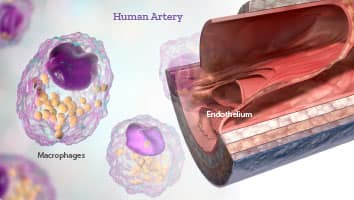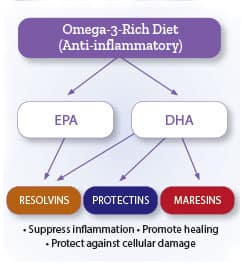Life Extension Magazine®
Chronic inflammation is connected to degenerative aging.
This has prompted scientists to coin the term “inflammaging” to describe this destructive process.1
Recent discoveries shed light on our understanding of inflammaging.2
Research shows that resolution of inflammation may be as important as inhibition of inflammation in the fight against age-related disorders.
The field of inflammation resolution is generating increasing interest.
This led scientists to identify compounds that help resolve inflammation. They are named:
Specialized pro-resolving mediators (SPMs)
Increasing SPM levels in preclinical models yields compelling findings.3
Clinical trials are currently recruiting participants and publishing results.4
How SPMs Resolve Inflammation

Specialized pro-resolving mediators are derived from polyunsaturated fatty acids, predominantly found in fish.3
In response to certain conditions, such as inflammation, small amounts of omega-3 fatty acids are converted to even more beneficial compounds: SPMs.3
Chronic inflammatory conditions such as inflammaging, have been associated with lower concentrations of SPMs in the body.5
SPMs resolve inflammation by three mechanisms:6-8
- Removing dead and dying cells through a process in which macrophage immune cells engulf and digest dying or dead cells. This helps clean up the aftermath of inflammatory cascades.
- Restoring inflammation balance by decreasing pro-inflammatory mediators, while increasing compounds that have anti-inflammatory activity.
- Renewing damaged tissue by promoting cellular regeneration.
These benefits promise to help prevent many chronic aging disorders including deposition of plaque in the arteries (atherosclerosis).9
Inflamed Arteries
Inflammation is a key player in the development of heart disease.
Atherosclerosis is partially driven by an imbalance between pro-inflammatory and inflammation-resolving mechanisms in the artery inner walls.9
Atherosclerosis can begin when LDL cholesterol (the “bad” cholesterol) particles get trapped inside the endothelium (lining of the arteries).
Macrophages enter the endothelium to clear out these oxidized LDL particles. If there is a lack of pro-resolving mediators, these macrophages will change into foam cells.9
This is a dangerous state that generally results in the foam cells dying and releasing their contents, creating an even greater pro-inflammatory environment.9
SPMs come into play here by initiating the removal of dead cells and foam cells through a process called efferocytosis.
If these cells are not removed, they contribute to plaque progression, which leads to atherosclerosis that endangers the heart, kidneys, and brain.9,10
How SPMs Differ from Omega-3s

The process of converting omega-3 fatty acids into SPMs requires several steps in the body.
When one eats cold water fish or takes fish oil supplements, tiny amounts may be converted to pro-resolving mediators (SPMs).
To meaningfully resolve inflammaging, higher amounts of standardized SPMs are often required beyond what can be obtained with fish oil.
Preclinical Research on SPM Precursors
In preclinical studies, SPMs and SPM precursors have been shown to have a variety of biological benefits.
Studies in mice have demonstrated impressive resolution benefits in a variety of disease models using the SPM precursor 18-HEPE.
SPM precursors enable formation of specialized pro-resolving mediators (SPMs) in the body.
One study involved a rodent model that mimics some of the complications related to cardiovascular disease. Following surgery, researchers injected mice with the SPM precursor 18-HEPE every three days.12
The mice that received 18-HEPE were significantly shielded from damaging complications brought on by the surgical procedure.
Another study used a mouse model of melanoma metastasis. Researchers pretreated mouse melanoma cells with the SPM precursor 18-HEPE while controls were not treated.
Healthy mice were then administered the SPM precursor 18-HEPE-treated melanoma cells and received additional 18-HEPE injections every other day. The SPM precursor-treated mice had significantly less formation of tumor colonies compared to controls.13
Another group of researchers found that treatment with the SPM precursor 17-HDHA was able to reverse pain behavior in two rat models of osteoarthritis.14
The Science Behind Specialized Pro-Resolving Mediators (SPMs)
SPM precursors are predominantly derived from the omega-3 fatty acids EPA and DHA.
But obtaining meaningful potencies of SPMs requires a series of complex metabolic processes that are often lacking in aging individuals.
The omega-3 fatty acid precursors needed to produce SPMs in the body include:11
- 18-HEPE (18-hydroxyeicosapentaenoic acid)
- 17-HDHA (17-hydroxydocosahexaenoic acid)
- 14-HDHA (14-hydroxydocosahexaenoic acid).
These precursors listed above are then converted into the following specialized pro-resolving mediators (SPMs):
- Resolvins
- Protectins
- Maresins
These make up the bulk of the SPMs that target inflammation through the three steps of removing, restoring and renewing.
New Human Trial of SPM Precursors

A human trial of SPM precursors was published in January 2020 and showed remarkable results.
In this study, 22 healthy volunteers aged 19 to 37 were randomized. One group received an enriched fish oil supplement containing omega-3 PUFAs plus a combination of SPM precursors, including 18-HEPE, 17-HDHA, and 14-HDHA. The other group received a placebo.18
Researchers separated the participants into different dosing groups and performed a series of tests. They were able to conclude that the SPM precursors:
- Significantly increased cell surface proteins involved in reversing inflammation and platelet aggregation (which leads to harmful clotting) caused by the addition of a pro-inflammatory stimulus in the drawn blood of the patients.
- Increased clearance of Staphylococcus aureus and E. coli, by immune cells, which was highest at the final measurement, after 24 hours.
- Decreased platelet activation, a central part of the process that leads to a blood clot, in association with an increased level of resolvins.
- Increased the expression of genes linked to immune responses, recruitment of immune cells that fight infection and other diseases, and cellular metabolism in peripheral blood cells.
Omega-3s Help Resolve Inflammation

Because the original sources of SPMs are primarily the omega-3 fatty acids EPA and DHA, increasing the intake of these healthy fats will assist in resolving inflammation.19-21
In a recent clinical trial, researchers showed that in response to a pro-inflammatory stimulus, EPA and DHA intake leads to the formation of more SPMs.21
For five months, participants were given either EPA and DHA or a placebo daily, before receiving a pro-inflammatory stimulus. Blood was collected daily for five days after receiving the stimulus.
By the fifth day, the group that received the EPA and DHA had 229% higher SPM levels than the placebo group. The levels of systemic inflammation, as measured by C-reactive protein, were significantly lower in the EPA/DHA treatment group compared to placebo.
The researchers repeated this testing using slight variations with their methods. Results consistently showed that EPA and DHA intake increases the level of SPMs in response to a pro-inflammatory stimulus.
This is great news for those who eat lots of cold-water fish and/or take high-potency fish oil supplements. Those with potential inflammaging issues may want to supplement with SPM Precursors:
- 18-HEPE
- 17-HDHA
- 14-HDHA
What you need to know
SPM Precursors + Omega-3s Resolve Inflammation
- Chronic inflammation is a major risk factor in aging, age-related disease, and degenerative disorders.
- Scientists have identified compounds that resolve inflammation, called specialized pro-resolving mediators (SPMs).
- SPMs are mostly derived from the omega-3 fatty acids EPA and DHA, which are primarily found in fish. A recent clinical trial showed that supplementation with a marine oil enriched with SPM precursors increases SPM levels and helps resolve inflammation.
- Another clinical trial showed that supplementation with omega-3s also increased SPMs in the body and helped lower levels of the inflammatory marker C-reactive protein.
Preclinical Research on SPMs
Preclinical data demonstrate promising results from the direct use of specialized pro-resolving mediators (SPMs).
In one study, researchers tested the effects of an SPM resolvin on mice that had obesity-associated osteoarthritis. The treatment was injected into the animals’ joints. The results showed a significant reduction in pro-inflammatory macrophage infiltration into the soft tissue surrounding the joints (synovium), reduced severity of synovium inflammation, and prevention of cartilage degradation.15
A review of preclinical studies concluded that SPMs may be an effective treatment for gum disease (periodontitis). These studies showed that topical application of a resolvin and a lipoxin (an omega-6-derived SPM) to inflamed periodontal tissue results in a significant prevention of tooth loss compared to the control group.16
A mouse study showed that injections with the SPM maresin reduced inflammation-induced neuropathic pain.17
Summary
Chronic inflammation is so strongly correlated with age that scientists describe it as inflammaging.1
For decades, researchers have been studying how to better inhibit inflammation. They are now also beginning to understand the importance of resolving inflammation.
An abundance of preclinical data has demonstrated substantial potential benefits of having higher levels of specialized pro-resolving mediators (SPMs) or SPM precursors.
Polyunsaturated fatty acids, particularly the omega-3 class, can be made into SPMs in your body. However, taking SPM precursors directly may be more effective.
Those concerned about chronic inflammation and persistently elevated inflammatory markers (like C-reactive protein and interleukin-6) may want to add a multi-SPM formula to their intake of omega-3 fatty acids.
Several clinical trials on SPM precursors are underway, with some completed and some still recruiting participants.4
Life Extension® is also now recruiting generally healthy people for a clinical trial. If you are in the Fort Lauderdale area and are interested in participating, please call 1-866-517-4536.
If you have any questions on the scientific content of this article, please call a Life Extension® Wellness Specialist at 1-866-864-3027.
Weight Loss Increases SPMs
In a recent study, researchers discovered that weight loss leads to a significant increase in the formation of SPMs.22
The researchers selected 42 patients with metabolic syndrome and took blood samples of their neutrophils, which are a short-lived type of white blood cell that eliminates pathogens.23 The researchers then stimulated the neutrophils and measured the release of SPMs to use for comparison after the intervention.
Patients were randomly selected to go through either a weight loss program (treatment) or a weight stabilization program (control).
After 16 weeks, the researchers again took blood samples of their neutrophils and provided stimulation to measure the amount of SPM release.
At the end of the trial, the SPM release from the neutrophils of the patients in the control group was unchanged compared to baseline.
The weight loss group had significantly elevated SPM release compared to baseline. Compared to the control group, weight loss led to a 2-fold increase the release of the SPM E-series resolvin.
References
- Franceschi C, Campisi J. Chronic inflammation (inflammaging) and its potential contribution to age-associated diseases. J Gerontol A Biol Sci Med Sci. 2014 Jun;69 Suppl 1:S4-9.
- Livshits G, Kalinkovich A. Inflammaging as a common ground for the development and maintenance of sarcopenia, obesity, cardiomyopathy and dysbiosis. Ageing Res Rev. 2019 Dec;56:100980.
- Fattori V, Zaninelli TH, Rasquel-Oliveira FS, et al. Specialized pro-resolving lipid mediators: A new class of non-immunosuppressive and non-opioid analgesic drugs. Pharmacol Res. 2020 Jan;151:104549.
- Available at: https://clinicaltrials.gov/ct2/results?cond=&term=specialized+pro resolving+mediators&cntry=&state=&city=&dist=. Accessed August 25, 2020.
- Dias IHK, Milic I, Heiss C, et al. Inflammation, Lipid (Per)oxidation, and Redox Regulation. Antioxid Redox Signal. 2020 Jul 20;33(3):166-90.
- Serhan CN. Pro-resolving lipid mediators are leads for resolution physiology. Nature. 2014 Jun 5;510(7503):92-101.
- Serhan CN. Treating inflammation and infection in the 21st century: new hints from decoding resolution mediators and mechanisms. FASEB J. 2017 Apr;31(4):1273-88.
- Serhan CN. Discovery of specialized pro-resolving mediators marks the dawn of resolution physiology and pharmacology. Mol Aspects Med. 2017 Dec;58:1-11.
- Back M, Yurdagul A, Jr., Tabas I, et al. Inflammation and its resolution in atherosclerosis: mediators and therapeutic opportunities. Nat Rev Cardiol. 2019 Jul;16(7):389-406.
- Available at. Accessed October 9, 2015.
- Lopez-Vicario C, Rius B, Alcaraz-Quiles J, et al. Pro-resolving mediators produced from EPA and DHA: Overview of the pathways involved and their mechanisms in metabolic syndrome and related liver diseases. Eur J Pharmacol. 2016 Aug 15;785:133-43.
- Endo J, Sano M, Isobe Y, et al. 18-HEPE, an n-3 fatty acid metabolite released by macrophages, prevents pressure overload-induced maladaptive cardiac remodeling. J Exp Med. 2014 Jul 28;211(8):1673-87.
- Li J, Chen CY, Arita M, et al. An omega-3 polyunsaturated fatty acid derivative, 18-HEPE, protects against CXCR4-associated melanoma metastasis. Carcinogenesis. 2018 Dec 13;39(11):1380-8.
- Huang J, Burston JJ, Li L, et al. Targeting the D Series Resolvin Receptor System for the Treatment of Osteoarthritis Pain. Arthritis Rheumatol. 2017 May;69(5):996-1008.
- Sun AR, Wu X, Liu B, et al. Pro-resolving lipid mediator ameliorates obesity induced osteoarthritis by regulating synovial macrophage polarisation. Sci Rep. 2019 Jan 23;9(1):426.
- Osorio Parra MM, Elangovan S, Lee CT. Specialized pro-resolving lipid mediators in experimental periodontitis: A systematic review. Oral Dis. 2019 Jul;25(5):1265-76.
- Serhan CN, Dalli J, Karamnov S, et al. Macrophage proresolving mediator maresin 1 stimulates tissue regeneration and controls pain. FASEB J. 2012 Apr;26(4):1755-65.
- Souza PR, Marques RM, Gomez EA, et al. Enriched Marine Oil Supplements Increase Peripheral Blood Specialized Pro-Resolving Mediators Concentrations and Reprogram Host Immune Responses: A Randomized Double-Blind Placebo-Controlled Study. Circ Res. 2020 Jan 3;126(1):75-90.
- Ramirez JL, Gasper WJ, Khetani SA, et al. Fish Oil Increases Specialized Pro-resolving Lipid Mediators in PAD (The OMEGA-PAD II Trial). J Surg Res. 2019 Jun;238:164-74.
- Barden AE, Shinde S, Burke V, et al. The effect of n-3 fatty acids and coenzyme Q10 supplementation on neutrophil leukotrienes, mediators of inflammation resolution and myeloperoxidase in chronic kidney disease. Prostaglandins Other Lipid Mediat. 2018 May; 136:1-8.
- Norris PC, Skulas-Ray AC, Riley I, et al. Identification of specialized pro-resolving mediator clusters from healthy adults after intravenous low-dose endotoxin and omega-3 supplementation: a methodological validation. Sci Rep. 2018 Dec 21;8(1):18050.
- Barden A, Shinde S, Tsai IJ, et al. Effect of weight loss on neutrophil resolvins in the metabolic syndrome. Prostaglandins Leukot Essent Fatty Acids. 2019 Sep;148:25-9
- Summers C, Rankin SM, Condliffe AM, et al. Neutrophil kinetics in health and disease. Trends Immunol. 2010 Aug;31(8):318-24.

